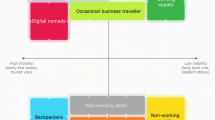Abstract
My concern in this essay is not so much with the invisible work or hidden labor produced by neoliberalism, but rather with what Joseph Pieper describes as an emerging culture of “total work” (Pieper, p. 43). More than the sheer (and increasing) number of hours of work, Pieper diagnoses a transformation in the way we view work. Work (or the necessary tasks of production and consumption) has become the exclusive point of reference for how we see and define ourselves. We are, Pieper feared, increasingly incapable of seeing beyond the working self. The human being (or homo sapien) has become the human worker (or homo faber). Historically, the ideal of leisure offered a counter vision (and its practices a counterbalance) to this tendency. Michael Oakeshott notes that while human beings must attend to the necessities for survival, they are most especially distinguished (from other animals) by their capacity for leisure—by an ability to pursue questions, conversations, and explorations that transcend the realm of production and consumption (Oakeshott 1989). To overlook and exclude leisurely pursuits is to diminish our humanity.
Similar content being viewed by others
Notes
Similar to Taylor’s use of imaginary Bourdieu’s habitus encompasses our taken-for-granted assumptions, habits, and ways of seeing.
The AACU (Association of American Colleges and Universities) defines a liberal education accordingly: “Liberal education has been a philosophy of education that empowers individuals with core knowledge and transferable skills and cultivates social responsibility and a strong sense of ethics and values. Characterized by challenging encounters with important issues, a liberal education prepares graduates both for socially valued work and for civic leadership in their society”.
Further evidence of this trend came to light with the College Board’s recent decision to no longer include obscure words on the SAT, instead focusing on “high utility” words. This pragmatic, seemingly innocuous decision reflects a way seeing and imagining the world—one that is given towards efficiency and productivity. We no longer have time or leisure for arcane words. See: http://www.nytimes.com/2014/04/16/education/revised-sat-wont-include-obscure-vocabulary-words.html.
Parts of this essay are taken from my essay Gary (2006). Also, I think it is unfair to place this burden exclusively on Kant. The history and rise of critical, discursive thinking certainly could include a whole slew of thinkers. Nevertheless, I think it is correct to say that a critical, scientific approach is dominant today, and, for the purposes of delineating the nature of leisure, Pieper’s explication of Kant serves as a useful foil for distinguishing what leisure is.
MacIntyre’s therapist is not a dismissal of therapy, per se, but rather is a critique of a distorted version of therapy that lacks a guiding telos and/or is incapable of interrogating the distorted telos of the aesthete/manager.
This is, without question, a caricature, intended to illustrate a point. The disappearance of leisure, I will argue, is in part impacted by the kind of characters that fill up the void.
Wallace, David Foster. “A Supposedly Fun Thing I’ll Never Do Again,” Harpers Magazine, January, 1996. Henceforth cited in the text as SF.
On the two types of anxiety see Kierkegaard (1981).
MacIntyre’s account chronicles the loss of the larger Aristotelian-Thomistic virtue tradition, of which the practice of leisure was an integral part.
Imperium is used in reference to the Roman empire, but in After Virtue it is intended to evoke our neoliberal paradigm.
This is recurring move, arguments on behalf of contemplation/meditation/leisure to improve worker productivity.
References
Association of American Colleges and Universities. 2007. What is a 21st century liberal education? Available at: https://www.aacu.org/leap.
Bauman, Z. 2000. Liquid modernity. Cambridge: Polity Press.
Bourdieu, P. 1990. The logic of practice. Stanford, CA: Stanford University Press.
Dostoevsky, F. 1992. The brothers karamazov. New York: Alfred A. Knopf.
Douglass, F. 1845. Narrative of the life of Frederick Douglass: An American slave. Project Gutenberg EBOOK. Available at: https://www.gutenberg.org/files/23/23-h/23-h.htm.
Gary, K. 2006. Leisure, freedom, and liberal education. Educational Theory 56(2): 121–136.
Greene, M. 1995. Releasing the imagination: Essays on education, the arts, and social change. San Francisco, CA: Jossey-Bass Publisher.
Hadot, P. 2005. There are nowadays professors of philosophy, but not philosophers. Journal of Speculative Philosophy 19(3): 229–237.
Heschel, A. 1951. The sabbath. New York: Farrar, Straus, and Giroux.
Heschel, A. 1977. Man is not alone. New York: Farrar, Straus, and Giroux.
Holmer, P. 1968. Kierkegaard and philosophy. In New themes in christian philosophy, ed. R. McInerny. Notre Dame, IN: University of Notre Dame Press.
Kierkegaard, S. 1981. The concept of anxiety: A simple psychologically orienting deliberation on the dogmatic issue of hereditary sin. Princeton: Princeton University Press.
MacIntyre, A. 1981. After virtue. Notre Dame, IN: Notre Dame Press.
Oakeshott, M. 1989. The voice of liberal learning. Indianapolis, IN: Liberty Fund.
Oakeshott, M. 1991. Rationalism in politics and other essays. Indianapolis, IN: Liberty Fund.
Pieper, J. 1998. Leisure: The basis of culture. South Bend, IN: Saint Augustine’s Press.
Scruton, R. 2009. Why Beauty Matters. http://www.bbc.co.uk/programmes/b00p6tsd.
Smith, J.A. 2009. Desiring the kingdom: Worship, worldview, and cultural formation, 39–72. Grand Rapids, MI: Baker Academic.
Sullivan, L. 1896. The Tall office building artistically considered. Lippincott's Magazine, March, 403–409.
Taylor, C. 2007. The Secular Age. Harvard, MA: Belknap.
Thoreau, H. 1985. Walden or life in the woods. New York: Avenel Books.
Wallace, D. 1996. Shipping Out: On the nearly lethal comforts of a luxury cruise. Harpers Magazine, January.
Woolf, V. 1989. A Room of One’s Own. New York, NY: Harcourt Inc.
Author information
Authors and Affiliations
Corresponding author
Rights and permissions
About this article
Cite this article
Gary, K. Neoliberal Education for Work Versus Liberal Education for Leisure. Stud Philos Educ 36, 83–94 (2017). https://doi.org/10.1007/s11217-016-9545-0
Published:
Issue Date:
DOI: https://doi.org/10.1007/s11217-016-9545-0



